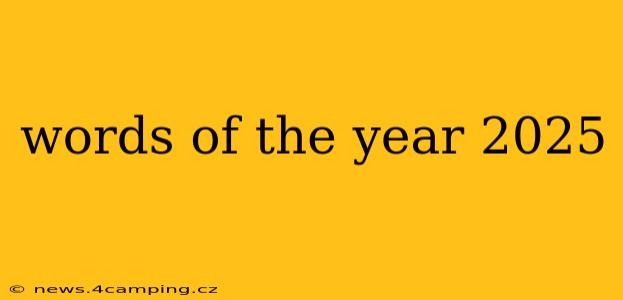The "Word of the Year" is more than just a trendy linguistic exercise; it reflects the dominant cultural conversations, anxieties, and aspirations of a given year. Predicting the words that will encapsulate 2025 requires analyzing current trends and anticipating their evolution. While definitive selection rests with organizations like Merriam-Webster or Collins Dictionary, we can explore potential contenders based on emerging societal themes.
Potential Candidates for Word of the Year 2025
Several words and concepts are strong contenders for capturing the essence of 2025, reflecting anxieties around technology, climate change, and evolving social dynamics.
1. Metaverse/Immersive:
The metaverse continues its evolution, moving beyond gaming and into diverse applications. Terms like "immersive" or even more specific descriptors related to particular metaverse experiences (e.g., "spatially-aware") could rise in prominence, reflecting its growing integration into daily life. The year 2025 may see the widespread adoption of specific technologies making the metaverse more accessible and commonplace, solidifying the use of descriptive terms related to this evolving space.
2. Sustainability/Regeneration:
Climate change remains a critical issue. While "sustainability" is already established, we might see a shift towards words emphasizing active restoration and renewal, such as "regeneration" or "eco-restoration." This reflects a growing awareness that mitigating climate change demands proactive solutions beyond simply reducing our environmental impact. Words reflecting a move towards circular economies and proactive environmental solutions are likely to gain traction.
3. Algorithmic Bias/AI Ethics:
As AI becomes more integrated into decision-making processes, concerns around algorithmic bias and AI ethics are paramount. These phrases, or shorter, more impactful variants, could gain widespread usage as society grapples with the ethical implications of increasingly autonomous systems. The potential for widespread societal impact necessitates public discussion, making related terminology a strong candidate for "word of the year."
4. Deglobalization/Geopolitical Fragmentation:
The trend of deglobalization, characterized by rising protectionism and geopolitical tensions, might solidify. Words reflecting this fragmentation, such as "balkanization" or more nuanced terms highlighting specific aspects of this trend (e.g., "regionalization") could emerge as contenders, reflecting shifts in international relations and trade.
5. Digital Wellbeing/Mindfulness:
With the ever-increasing digital presence in our lives, concerns about digital wellbeing and the need for mindfulness are growing. These terms, or related concepts like "digital detox" or "attention economy," might gain more significant prominence as a counterbalance to the pressures of constant connectivity.
Frequently Asked Questions (FAQs)
What criteria do dictionaries use to select a Word of the Year?
Dictionaries typically consider several factors, including the word's frequency of use, its cultural impact, its reflection of significant events, and its longevity in the language. A word must truly capture the zeitgeist of the year to be selected.
How are Words of the Year chosen?
The process varies slightly between organizations. Typically, it involves a committee of lexicographers and language experts analyzing data on word usage, media trends, and public discourse to identify the most significant word of the year.
What impact do Words of the Year have?
Words of the Year raise awareness of significant societal trends and linguistic changes. They can shape public discourse, influence marketing strategies, and provide a snapshot of the cultural landscape of a particular year. They also help to document the evolution of language.
Why are some years represented by multiple words or phrases?
Some years feature multiple words or phrases because no single word perfectly captures the dominant cultural themes. This approach allows for a more nuanced representation of the year’s linguistic landscape.
Predicting the future is always challenging, but by examining current trends, we can anticipate the language that will likely reflect the significant issues and developments of 2025. The eventual Word of the Year, chosen by reputable linguistic organizations, will provide a fascinating insight into the year's dominant narrative.
